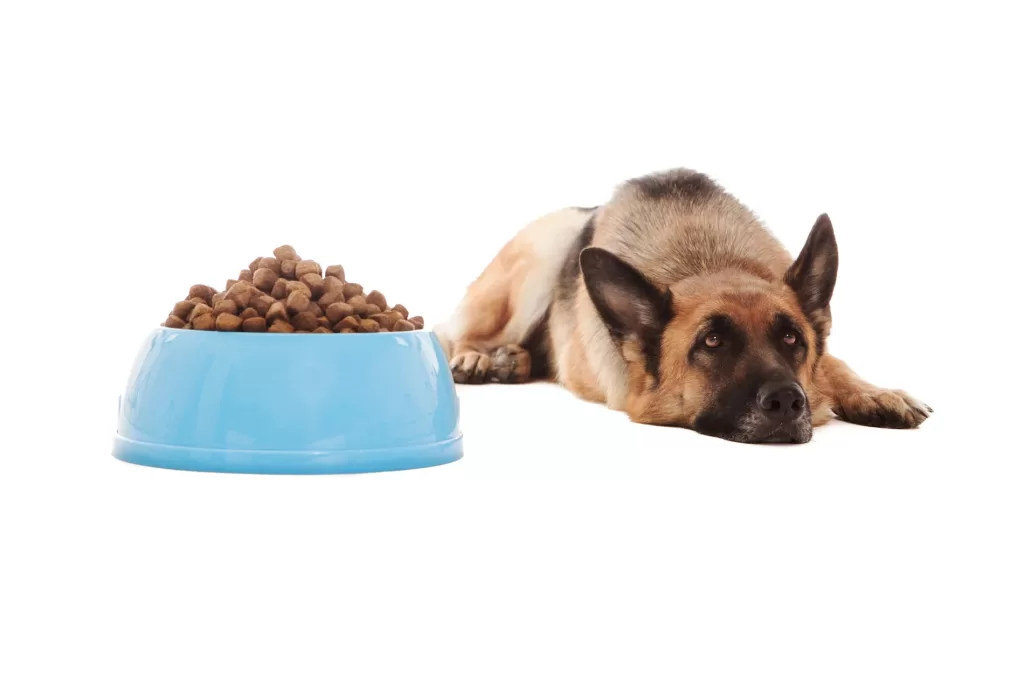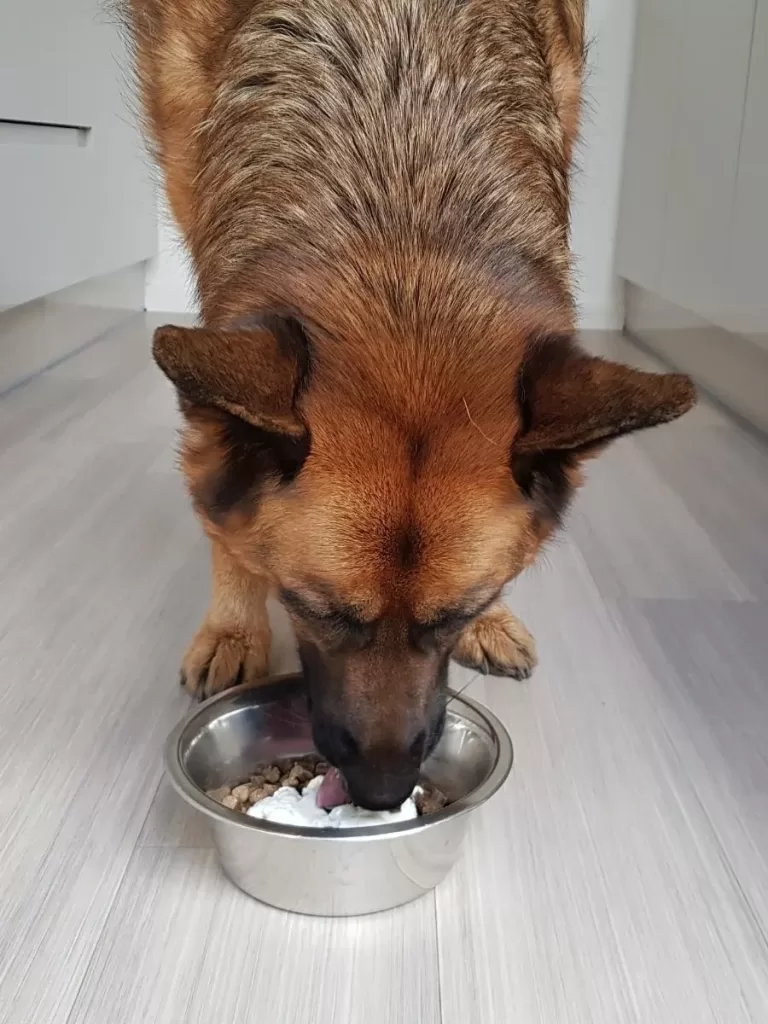Why you’re German shepherd is not eating? The German Shepherd is a loyal and obedient dog breed known for its protective nature. However, there are times when a German Shepherd does not eat as much as they should.
There are a few reasons why your German Shepherd is not eating. Maybe they’re not feeling well, they’re bored, or they’re not hungry. Before getting into the details on that, whatever the reason, there are things you can do to help them.
- First, make sure they always have access to fresh water. If they don’t drink, they don’t eat either.
- Next, examine their diet. Is it fresh and nutritious? If not, it’s time to change things up.
- Finally, make sure they are getting enough exercise. A tired dog is usually a hungry dog.
If you still have trouble getting your German shepherd to eat, make an appointment with your veterinarian. They can help you figure out what’s going on and get your pup back on track.
Why you’re German shepherd is not eating and what to do with that?

If you’re a German Shepherd owner, you’re probably familiar with the common problem of your dog’s lack of appetite. There are many reasons why your German Shepherd won’t eat, but here are five of the most common:
1. Your German Shepherd is stressed
Just like humans, dogs are also susceptible to stress. If your dog is constantly exposed to stressful situations, he may lose his appetite.
Some common causes of stress in German Shepherds include:
- Separation anxiety
- Fear of loud noises
- Lack of socialization
- Have to move to a new house
If you think stress is the cause for your German shepherd not eating, try creating a more peaceful environment for them. This may include providing more exercise, training them to be more comfortable in new situations, and spending more time with them.
Also Read: How to choose a Puppy Based on Your Requirements
2. Your German Shepherd is in pain
If your German Shepherd is in pain, they may not feel like eating. Because pain can make them feel nauseous.
Some common causes of pain in German Shepherds include:
- Arthritis
- Hip dysplasia
- Gastrointestinal problems
- Cancer
If you suspect that pain is the cause of your German Shepherd not eating, it is important to take them to the vet so that they can be properly diagnosed and treated.
3. Your German Shepherd has an infection
If your German Shepherd has an infection, they may not feel like eating because they are sick.
Some common infections that affect German Shepherds include:
- Kennel cough
- Parvovirus
- Distemper
If you think an infection is the cause of your German Shepherd not eating, it is important to take them to the vet so they can be properly diagnosed and treated.
4. Your German Shepherd has dental problems
If your German Shepherd has dental problems, they may not feel like eating because eating can be painful.
Some common dental problems that affect German Shepherds include:
- Gum disease
- Tooth decay
- Mouth ulcers
If you think dental problems are the cause of your German Shepherd not eating, it’s important to take them to the vet so they can be properly diagnosed and treated.
5. Your German Shepherd has a gastrointestinal problem
If your German Shepherd has a gastrointestinal problem, they may not feel like eating because they feel nauseous or lose their appetite.
Some common gastrointestinal problems that affect German Shepherds include:
- Gastroenteritis
- Pancreatitis
- Liver disease
If you think a gastrointestinal problem is causing your German Shepherd not to eat, it’s important to take them to the vet so they can properly diagnose and treat them.
If you are concerned about your German shepherd’s lack of appetite, it is important to take them to the vet so they can properly diagnose and treat.
How long can a German Shepherd go without eating?
The answer to this question depends on a few factors such as the dog’s age, health and activity level. A young, healthy German Shepherd can usually go without food for a few days before developing health problems. An older dog or a dog with health problems can only go without food for a day or two before becoming ill.
As a large breed, German Shepherds require a diet rich in protein and fat. This is because their metabolisms are much faster than smaller breeds and require more calories to maintain their energy levels.
Ideally, German Shepherds should be fed two to three times a day. This ensures they are getting the nutrients they need without overloading their digestive systems.
But a healthy German Shepherd can go without food for five to seven consecutive days as long as it drinks water.
How can I stimulate my dog to eat?

When your dog won’t eat, it’s a frustrating and worrying time. There are many reasons why your dog won’t eat, but don’t worry, there are many things you can do to help. The first step is to rule out any medical causes. If your dog has been sick or injured recently, this could be the cause of their loss of appetite. Be sure to take them to the vet for a check-up.
Once you’ve ruled out any medical causes, there are still a number of things you can do to try and stimulate your dog’s appetite.
- The easiest thing you can do is change their diet. If they are used to dry food, try adding wet food or vice versa. You can also try a completely different diet.
- It’s also important to make sure their food is full of flavor. Dogs can be fussy eaters, so if their food is bland, they won’t be very interested. Adding wet dog food to dry food makes it more palatable, or you can try cooking their food yourself to add extra flavor.
- If your dog is used to feeding at regular times, try changing up their routine a little. Feed them at different times of the day or in different places. This helps them assess and stop them from getting bored with their food.
- If your dog is generally healthy but not very interested in food, there are still things you can do. One is to feed them small meals frequently. This way, they won’t be as curious, but they’ll still get the nutrition they need.
- You can also try adding some special treats to their diet. This can be anything from a bit of cooked chicken to some cheese or a small piece of liver. Most dogs love treats, so this is a very effective way to stimulate their appetite.
- There are also many supplements that can help stimulate a dog’s appetite. These can be found in most pet stores and are generally very safe to give to dogs. If you’re not sure which one to choose, ask your vet for advice.
If you’ve tried all of these and your dog still won’t eat, it’s important to seek professional help. There may be an underlying medical condition causing their loss of appetite, and a vet can help you identify and treat this.
Why is my dog not eating but drinking water and throwing up?
There are a number of potential reasons why your dog may not be eating but drinking water and throwing up.
It could be that your dog is sick and is trying to hydrate itself. It could also be that your dog is stressed or anxious, which can lead to loss of appetite.
If your dog has been vomiting, it is also possible that it is suffering from gastritis, which is inflammation of the stomach. If your dog is showing any other signs of illness, such as lethargy or diarrhea, it is important to take it to the vet for a check-up.
Conclusion
There are many reasons why your German Shepherd may not be eating. He may be sick or he may be stressed or anxious. If you’re not sure what the problem is, it’s a good idea to take him to the vet for a check-up.
A vet can rule out any medical causes and give you some advice on how to proceed. If your dog is healthy but still not eating, there are a few things you can try. First, make sure his food is tasty and nutritious.
You may need to experiment with different brands or types of food to find what he likes. You can also try adding some wet food or treats to make his dry food more appealing. Finally, make sure he has a regular routine for meals and snacks.
If he gets used to eating at a certain time, stick to that schedule as closely as possible. If you still have trouble getting your dog to eat, talk to your vet or professional trainer for more advice.

